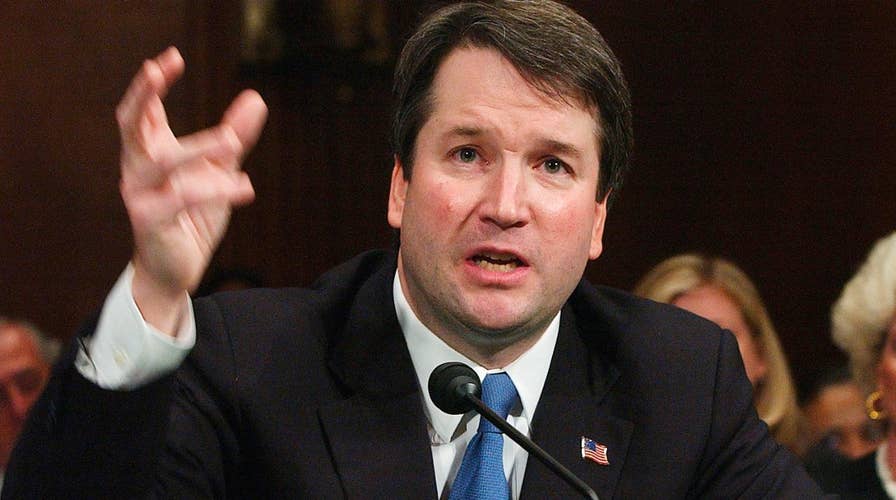Who is Brett Kavanaugh, Trump's SCOTUS pick?
President Trump picks Brett Kavanaugh to replace the retiring Justice Anthony Kennedy on the Supreme Court. Here's a look at Trump's nominee.
The nation’s largest LGBT organization, the Human Rights Campaign, has unsurprisingly come out swinging in opposition to Senate confirmation of Judge Brett Kavanaugh, President Trump’s nominee to fill a vacancy on the U.S. Supreme Court.
The group is using a specious cherry-picked “report” as the backbone of its opposition to Kavanaugh, who currently serves as a judge on the U.S. Circuit Court of Appeals for the District of Columbia.
The HRC disapproval of Kavanaugh should raise precisely zero eyebrows. Following the 2016 elections, the organization has all but become an official wing of the Democratic Party and the tedious “Resistance.”
What is astonishing is that in the dozen pages issued by the HRC painting Kavanaugh as an enemy of the LGBT community, there is not a single mention of anything he has done, said, or written that could be even remotely construed as anti-LGBT.
In fact, there are a number of reasons LGBT Americans should take heart in Kavanaugh’s nomination and his likely confirmation as the next associate justice of nation’s highest court.
In 2003, while on the staff of President George W. Bush, Kavanaugh met with a group of over 200 gay men as part of a Log Cabin Republicans event at the Eisenhower Executive Office Building – hardly the mark of a raging homophobe jurist.
As a clerk for Supreme Court Justice Anthony Kennedy – whose recent retirement created a vacancy Kavanaugh has been nominated to fill – Kavanaugh served the most quantifiably pro-gay Supreme Court justice in the history of the United States.
No one authored more pro-gay opinions – with more far-reaching consequences – than Kennedy. The concurrence of another former Kennedy clerk, Justice Neil Gorsuch, in the Masterpiece Cakeshop decision this year affirmed that “our society has come to the recognition that gay persons and gay couples cannot be treated as social outcasts or as inferior in dignity and worth.”
That could well lead one to conclude that Kennedy’s sympathy to the challenges of LGBT Americans was imparted to his clerks.
In the very pages of the HRC critique of Kavanaugh’s record is a remarkable admission: “During his 12 years on the D.C. Circuit, he did not substantively address any of the Supreme Court’s seminal LGBTQ decisions.”
In the absence of anything substantive or explicit to condemn, as Buzzfeed notes, the report instead zeroes in on “concerns about Kavanaugh’s views on the Affordable Care Act, voter ID laws, and federal agency power, as well as his rulings in employment discrimination cases.”
The rollout of the HRC Kavanaugh file includes an assertion that “a thorough review of Kavanaugh’s record on LGBTQ issues, during his time at the White House in particular, will be crucial to the nomination process.”
On this point I agree. But the very title of the report – “Brett M. Kavanaugh: Wrong for LGBTQ People. Wrong for the Supreme Court” – shows that the findings of this “analysis” were fait accompli before a single file from the Kavanaugh archives was cracked.
None of this is surprising. The motley assemblage in front of the Supreme Court on the night Kavanaugh was nominated was a mad-libs protest confirming that anyone nominated by President Trump would be unacceptable to the left – LGBT or otherwise.
The HRC report on Kavanaugh is simply a reverse engineering of the conclusion that LGBT Democrats came to the moment Kennedy announced his retirement in June.
To be sure, serious questions remain regarding Kavanaugh’s perspective on LGBT legal issues currently percolating through the federal courts, but sussing out those answers is the purpose of Senate confirmation hearings.
Opposing a Kavanaugh confirmation before even hearing out the nominee is an affront to our country’s sacred democratic process and the deference a judge with an undeniably accomplished career deserves.
Brett Kavanaugh deserves a full hearing by the Senate Judiciary Committee. The LGBT community owes him an open mind.

